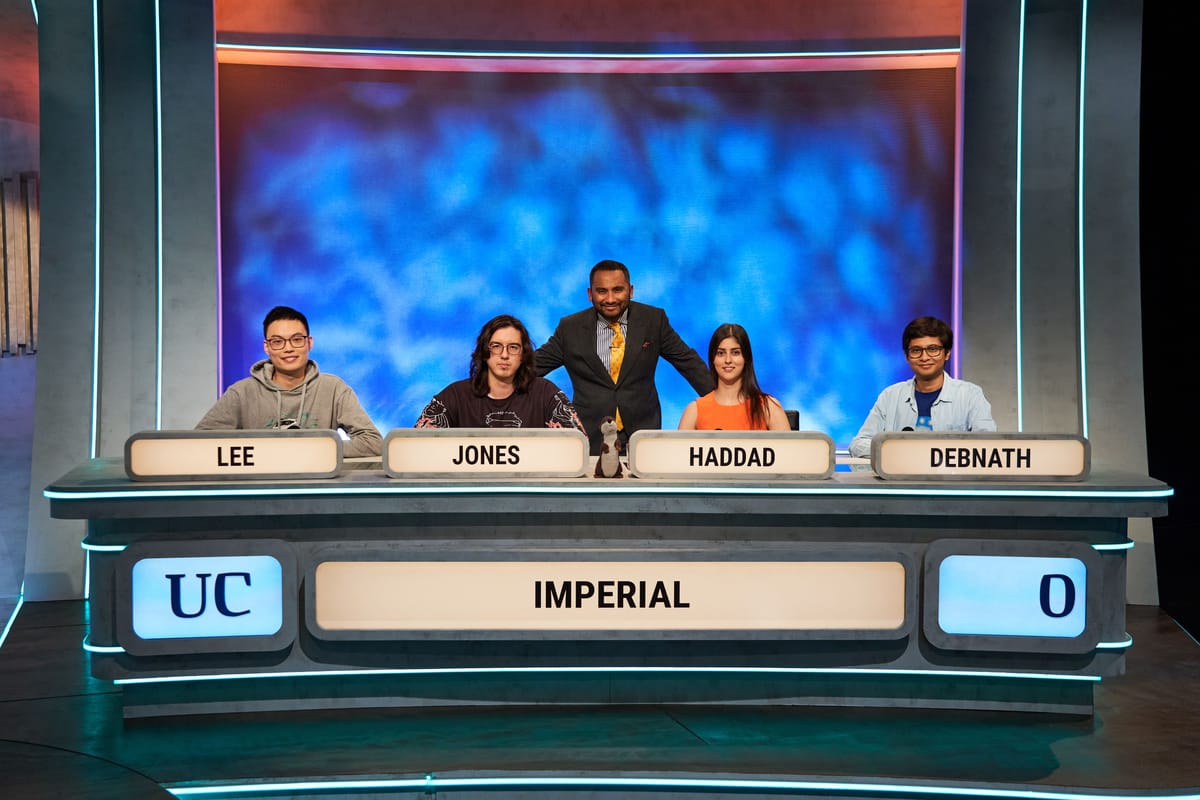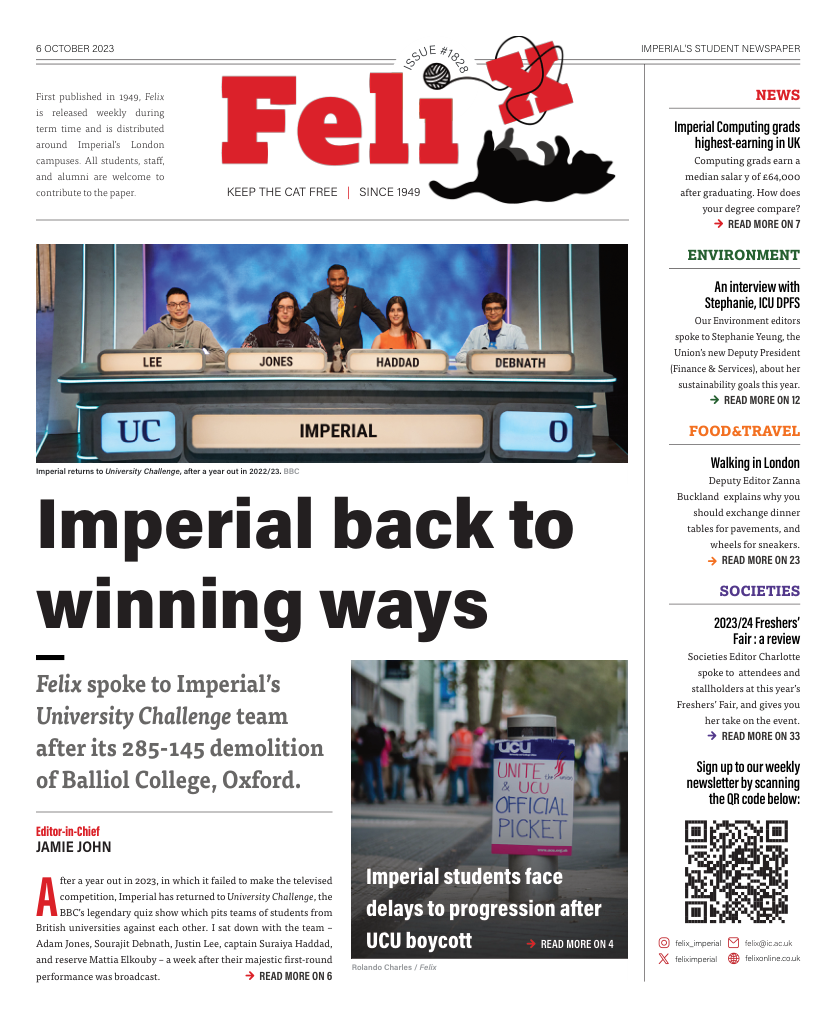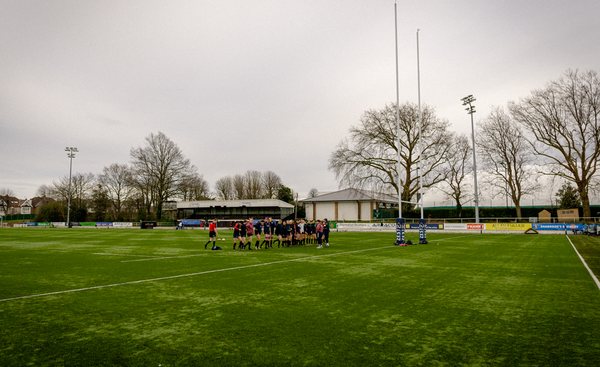Imperial back to winning ways on University Challenge
Felix spoke to Imperial’s University Challenge team after its 285-145 demolition of Balliol College, Oxford.

After a year out in 2023, in which it failed to make the televised competition, Imperial has returned to University Challenge, the BBC’s legendary quiz show which pits teams of students from British universities against each other. I sat down with the team - Adam Jones, Sourajit Debnath, Justin Lee, captain Suraiya Haddad, and reserve Mattia Elkouby – a week after their majestic first-round performance was broadcast.
This year, the show underwent a revamp: long-time presenter Jeremy Paxman left, and was replaced by Amol Rajan, BBC Media Editor and former editor-in-chief of The Independent newspaper. Paxman was renowned for his withering retorts to participants (“That is a completely useless answer”, “Only out by 600 years or so”). Rajan, in contrast, was encouraging, and behind the scenes, says the team, very nervous.
Imperial’s team has an illustrious past, sharing the record for most series wins (four) with Magdalen College, Oxford, and the University of Manchester. Unlike Magdalen and Manchester, who last won in 2013 and 2011 respectively, Imperial’s last victories came more recently, in 2022 and 2020. Those wins produced University Challenge legends like Michael Kohn and Brandon Blackwell. Blackwell built up a following during his time on the show and became affectionately known as ‘Imperial Brandon’. He was a contestant on Who Wants To Be A Millionaire in 2012, winning $43,100, and in 2022, starred in The Chase USA as a ‘Chaser’.
Did the team feel pressure to live up to this legacy?
Not initially, says Suraiya. “I Just wanted us to enjoy the first round, and not to lose it.”
Justin smiles in agreement. “Yeah, the pressure of the legacy might have been stressful, but it’s significantly less stressful than worrying about not making a complete fool of yourself on TV.”
“Although in that first introduction to the team, you don’t know what they’re going to say”, continues Suraiya. “And Amol Rajan said, ‘Oh yeah, they’ve won it four times.’ It was such a hyped-up introduction to the team, that then I was like, ‘Now I’m a bit more nervous.’”
In fact, one previous Imperial University Challenge winner was a big help in training this year’s team, says Sourajit.
“Even though she had graduated, Fatima Sheriff [a 2022 Challenge winner] would come to college for our weekly practice session. She was in contact with us all the time, and would help us sidestep a lot of the ‘local minima’ we would have been stuck in otherwise. We didn’t have to face some of the problems other teams did, because we already knew what to expect and how to go about things.”
Whenever I hear something about mildly interests me, I look it up on Wikipedia and immediately go down a vortex of stuff where you’re led from one thing to another
Imperial’s quizzing success is all the more extraordinary given the College’s focus on STEM. Other university quiz teams benefit from a more academically diverse talent pool, with the ability to recruit students studying humanities and arts subjects.
Adam sees this as an advantage: “You’re more likely to find STEM students who come home and read a book, or watch a film, than you are to find humanities students who get back and say, ‘I’m going to write some computer programs.’” This, suggests the team, gives each of them a broader overall knowledge base.
In their first round this year, Imperial dominated Balliol College, Oxford, scoring 285 to Balliol’s 145. Their success came in part due to the speed with which they responded, consistently beating Balliol to the buzzer, and then capitalising on the bonus questions which followed.
University Challenge rounds follow a relatively simple format: each round has its own theme, and teams are asked a series of ‘starter’ questions. The first team to buzz in has the opportunity to answer the question. A correct answer is rewarded with 10 points, and three bonus questions, worth five points each. Interrupting a starter question with an incorrect answer is penalised with a five-point deduction.
“You have to out-buzz the other team,” says Suraiya, when I ask about the team’s strategy. “But on an individual level, the calculation we’re all making is, ‘Do I buzz early [before the question has been read out in full], or do I wait for confirmation in the stem of the question and buzz?’”
It was such a hyped-up introduction to the team, that then I was like, 'Now I'm a bit more nervous.'
Reserve Mattia was an important part of the strategy, attending the televised rounds, and playing the role of the opposition in practice sessions. “I was always with the team,” he says, “In the studio and out – constantly writing things down, making notes of weaknesses”.
During practice sessions, the team would watch old University Challenge episodes and try to buzz in before those on screen. “It was basically four against nine – the two teams on screen, plus me,” says Mattia.
The captain serves a key role, particularly in bonus rounds, in which they give a final answer after the team confers, or nominating another member to respond in their place. They are selected for their ability to maintain a cool head, make good judgement calls under pressure, and communicate effectively.
“As the captain, I have to assess whether we are actually going to get to the answer in time, or whether we should we just move on and get a new question that we might get right,” explains Suraiya.
Together with the rest of the team, the captain is picked by a selection panel consisting of former Imperial University Challenge competitors, and sometimes Quiz Society committee members.
The internal selection process consists of two rounds. The first takes place in late October; applicants are asked to write down their answers to 100 questions, and around 15 high-scoring individuals are admitted to the second round in November. This round mimics the format of the University Challenge show; candidates are sorted into teams of four, and team members are cycled in and out to see how effectively they work together. The final four are selected not only for their individual skills, but their ability to function as a unit.
The team is then interviewed by the BBC showrunners, who select 28 university teams to appear on the show from over 100 applicants.
Filming takes place over three weekends, beginning at the end of February, but competitors are not allowed to announce the results to anyone but family and close friends.
The team this year comes from a diverse range of backgrounds: Sourajit, for example, worked as an engineer for India’s space agency for two and a half years before joining Imperial. They all agree that prior experience quizzing is critical, but whereas Justin first started quizzing competitively at school in Brighton, Adam only began at university.
Being inquisitive, they say, is the best way to get better at quizzing. “I think the main reason why I’m quite good at quizzes in general is just like whenever I hear something about mildly interests me, I look it up on Wikipedia and immediately go down a vortex of stuff where you’re led from one thing to another,” says Mattia.
Beyond that, joining Quiz Society and participating in their events is an effective way to build speed and accuracy on the buzzer. Not every team member was part of Quiz Society before they went to trials, but, says Justin, “You get to know people in the quiz circuit, and to feel your finger on the buzzer for the first time.”
Imperial will appear next on University Challenge in the new year. If you would like to be a part of the 2024 team, trials will be held on 24th and 31st October on the South Kensington campus, 26th in Charing Cross, and 27th in White City. Please email quiz@imperial.ac.uk for any questions about the process. Follow @imperialquizsoc on Instagram, @imperialquiz on X (formerly Twitter), or Imperial College Quiz Society on Facebook to stay up to date.







